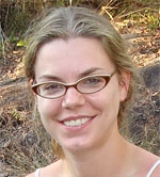Awards
- College of Arts and Sciences Outstanding Young Alumni Award - 2011

When you learn about Erin Patrick's work with the Women's Refugee Commission's Fuel and Firewood Initiative, her argument seems so logical you can scarcely believe she has to make it. Her position boils down to the idea that humanitarian aid should include not just food but the means to prepare meals without threatening the health, safety, and sustainability of the community. As it stands, however, there's no agency responsible for delivering cooking fuel to accompany the dried beans and grains provided for subsistence. Instead, women trek miles out of their camps to gather firewood �" risking assault, depleting the area's natural resources, and exposing their families to toxic wood smoke.
As the Fuel and Firewood Initiative's Senior Program Officer, Patrick, BA'98, works with aid agencies, advocacy organizations, and policy makers toward the inclusion of cooking fuel in humanitarian aid supplies. This year's College of Arts and Sciences Outstanding Young Alumni Award recipient, Patrick wrote the groundbreaking 2005 report, Beyond Firewood: Fuel Alternatives and Protection Strategies for Displaced Women and Girls, which has brought the issue growing recognition. Patrick has been researching firewood collection and use in displaced persons' camps Africa, Haiti, Nepal and Thailand, and has developed a set of policy guidelines for the humanitarian system to protect the health and safety of displaced people as well as the natural environment surrounding refugee camps.
"Initially, it was a question of gender-based violence. We wanted to reduce the vulnerability of women and girls to rape during firewood collection," Patrick explains. "But we soon began to expand our focus once we recognized that firewood collectors were harming the environment by cutting down trees in an ever-widening circle, and that the smoke from the wood, especially indoors, was causing serious respiratory infections. We also saw that women weren't just using the firewood, they were selling it, which told us that we needed to be addressing their livelihoods."
Patrick's work draws on her IU training in the College's Department of Political Science, which she followed with a master's program at John Hopkins' School of Advanced International Studies. "What a political science degree does is give you a curiosity about how other countries work and function, which is really important to what I do," she says. Patrick also majored in French at IU, which has turned out to be surprisingly useful. "I've done a lot of work in Haiti and Congo, so French has been really handy," she says.
While at IU, Patrick focused on the conflict in Northern Ireland, investigating what motivated individuals to join the Irish Republican Army. Over time, as her career took her from the Kettering Foundation to the Migration Policy Institute and Human Rights Watch, she says she moved from a more theoretical interest in the causes of war to the practical question of helping those affected by it. For this Poli-Sci grad, "I wouldn't say that what I do is actually very political. I'm not so much looking at why these things happen as what we can do to fix it."